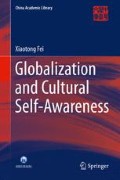Abstract
Zhou Yuning (reporter from the Arts Daily): Thank you very much, Professor Fei, for agreeing to this interview today. I would like to ask you how you view issues in Chinese culture as we enter the new millennium, a time of great changes both globally and domestically. Of course this is a very broad topic, but I think can we start off by looking at some specifics. What is your assessment of culture today? I’ve heard that at several meetings, you have pointed out that we are living in an overly materialistic age and that you hope that a new period will begin, where people will be more preoccupied with the things of the mind and spirit, with artistic expression and less with material gratification.
Arts Daily (in Chinese, Wenyi bao, 《文艺报》), September 3, 2002.
Access this chapter
Tax calculation will be finalised at checkout
Purchases are for personal use only
Notes
- 1.
Dagu is a traditional form of Chinese performing arts, popular in North China. Accompanied by a three-stringed instrument, the performer beats a small drum and sings verses of 7–10 characters long.
- 2.
In 1945, the Lu Xun Academy of Arts in Yan’an created an opera based on folk melodies and singing styles of Shaanxi province. It tells the story of a young girl forced by the local landlord to hide in the mountains where her hair turns white from suffering. She is eventually rescued by her lover.
- 3.
Mao Zedong believed that art and literature has a class character and should first and foremost serve the working people. It should spring from and closely reflect their lives and reality.
- 4.
Two forms of storytelling popular in the region around Suzhou. Pinghua is performed by a single performer, telling stirring tales of ancient battles and warriors. Tanci is performed by two people playing two different kinds of stringed instruments. They sing in a duet form, telling folk and love stories.
- 5.
A well-known tragic love story from the Eastern Jin dynasty (317–420). Also sometimes called The Butterfly Lovers or The Eastern Romeo and Juliet.
Author information
Authors and Affiliations
Rights and permissions
Copyright information
© 2015 Foreign Language Teaching and Research Publishing Co., Ltd and Springer-Verlag Berlin Heidelberg
About this chapter
Cite this chapter
Fei, X. (2015). From the People. In: Globalization and Cultural Self-Awareness. China Academic Library. Springer, Berlin, Heidelberg. https://doi.org/10.1007/978-3-662-46648-3_23
Download citation
DOI: https://doi.org/10.1007/978-3-662-46648-3_23
Publisher Name: Springer, Berlin, Heidelberg
Print ISBN: 978-3-662-46647-6
Online ISBN: 978-3-662-46648-3
eBook Packages: Humanities, Social Sciences and LawSocial Sciences (R0)

